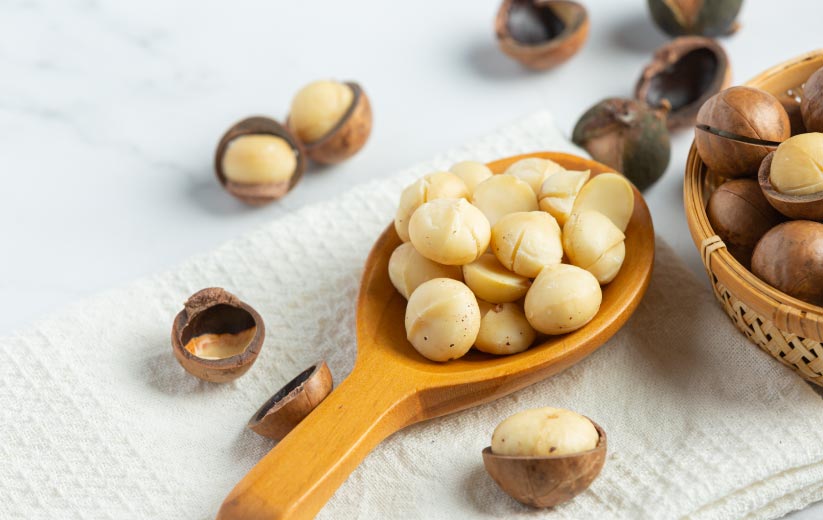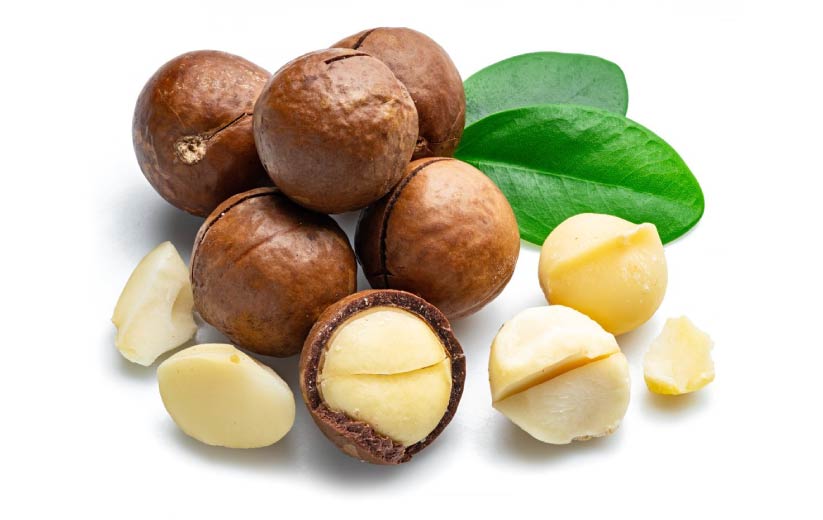Macadamia nuts, also known as macadamia nuts, originate from Australia and today have appeared in many parts of the world, including Vietnam. This nut is well known for its characteristic rich flavor, which, along with its high nutritional value, offers many benefits for overall health.
Macadamia nuts are the seeds of the macadamia tree, native to Australia and grown in many parts of the world, such as Brazil, Costa Rica, Hawaii, and New Zealand, including Vietnam.
Macadamia nuts are nuts with a subtle, butter-like flavor, with a rich, nutty taste that brings a new sensation to those who taste them for the first time. Like most nuts, macadamia nuts are rich in nutrients and healthful plant compounds. This nut is considered a miracle cure for several health problems, including improved digestion, heart health, and weight and blood sugar control.
In addition, macadamia nuts contain monounsaturated fatty acids (MUFAs) and plant substances that help reduce cholesterol effectively. Here are 10 health benefits and nutritional value of macadamia nuts.
Rich in nutrients
Macadamia nuts are high-calorie nuts, containing many essential fats, vitamins, and minerals that are beneficial to health. One ounce (28 grams) of macadamia nuts provides:
- Calories: 204
- Protein: 2 grams
- Fat: 23 grams
- Fiber: 3 grams
- Sugar: 1 gram
- Carbs: 4 grams
- Manganese: 58% of the Daily Value (DV)
- Dong: 11% of DV
- Thiamine: 22% of the DV
- Iron: 6% of DV
- Magnesium: 9% of DV
- Vitamin B6: 5% of the DV.
Plus, macadamia nuts are high in monounsaturated fat, a type of fat that improves and promotes heart health, helping to lower total cholesterol and low-density lipoprotein (LDL).
Macadamia nuts also contain very little sugar and carbs, along with a moderate fiber content. This harmonious combination has brought many benefits, especially for people with diabetes because of their ability to control blood sugar well.
Improve heart health
Macadamia nuts can reduce the risk of cardiovascular disease. Recent studies have shown that if you eat about 0.3-1.5 ounces (8-42 grams) of macadamia nuts per day, you will reduce your total cholesterol levels and harmful LDL levels by about 10%. body.
What’s more, eating 1.5-3 ounces (42-84 grams) of macadamia nuts per day significantly reduces inflammatory symptoms, such as the inflammatory mediator Leukotriene B4. Meanwhile, inflammation is one of the leading risk factors for cardiovascular diseases.
Researchers have found that the heart health benefits of macadamia nuts can be traced back to the nut’s rich monounsaturated fat content. This fat helps better control heart health and reduces the risk of heart attack causing stroke or death.
Antioxidant supplement
Macadamia nuts contain high levels of antioxidants, which help prevent free radicals that hurt overall health. The antioxidants present in macadamia nuts help neutralize free radicals – these are unstable molecules that can seriously damage cells and increase the risk of chronic diseases such as heart disease. diabetes, Alzheimer’s disease.
In particular, macadamia nuts contain the highest amount of flavonoids of all nuts. This is an antioxidant, cholesterol-lowering, and great anti-inflammatory. In addition, this nut is also rich in vitamin E Tocotrienols, extremely effective in fighting cancer, antioxidant, and brain diseases.

Reduced risk of metabolic syndrome
Metabolic syndrome refers to high cholesterol and blood sugar levels that can lead to serious life-threatening risks, including heart disease, stroke, or type 2 diabetes.
Studies have shown that adding macadamia nuts to your daily diet will increase your resistance to type 2 diabetes and metabolic syndrome. Just eating 1-3 ounces (equivalent to 28-84 grams) of macadamia nuts per day will significantly improve your Hemoglobin A1c- your average blood sugar level.
Helps improve gut health
The rich amount of fiber found in macadamia nuts provides many health benefits for the body’s digestive and intestinal systems. This fiber acts as a prebiotic, helping to nourish the beneficial bacteria in the gut.
On the other hand, these beneficial bacteria produce short-chain fatty acids (SCFAs), including butyrate, acetate, and propionate, which have anti-inflammatory effects, and prevent irritable bowel syndrome (IBS), diabetes, and obesity. obesity, ulcerative colitis, or Crohn’s disease.
Helps to lose weight effectively
Although macadamia nuts contain a lot of calories, it has an effective weight-loss effect. Because in macadamia also has a large amount of protein and fiber, which helps reduce hunger and increase feelings of fullness.
In addition, some studies also show that a part of the fat contained in this seed is still present in the fiber wall of the seed during digestion. Therefore, macadamia will provide fewer calories, supporting healthy weight loss for overweight and obese people.
Macadamia nuts also have palmitoleic acid – omega 7, which helps overweight people control their weight and prevent unwanted weight gain.
Prevent cancer
Macadamia nuts contain plant compounds, including tocotrienols and flavonoids, that prevent and destroy cancer-causing cells.
Improve brain health
In addition to their ability to prevent cancer, plant compounds tocotrienols in macadamia nuts also help protect brain cells from the bad effects of glutamate, a risk factor for diseases like Parkinson’s and Alzheimer’s.
Increased longevity
Eating macadamia nuts regularly reduces the risk of premature death by about a third.
Easy to incorporate into the diet
Nowadays, you can easily find macadamia nuts in most supermarkets. This type of seed not only has high nutritional value but also easily combines with other foods in the daily diet.
Raw-shelled macadamia nuts are the most popular and nutrient-dense. You can prepare them yourself in many different forms such as roasted or dried. In addition, macadamia butter can be used to accompany cookies, bread, fruits, yogurt, or oatmeal. You can also sprinkle some macadamia nuts into soups when enjoying light meals.
Moreover, this seed has a shelf life of up to one year if stored carefully. You should keep them in the refrigerator to ensure the freshness of the seeds for longer.
Follow the website ongreenbeauty.com to get more health, nutrition, and beauty information to protect the health of yourself and your loved ones in your family.




